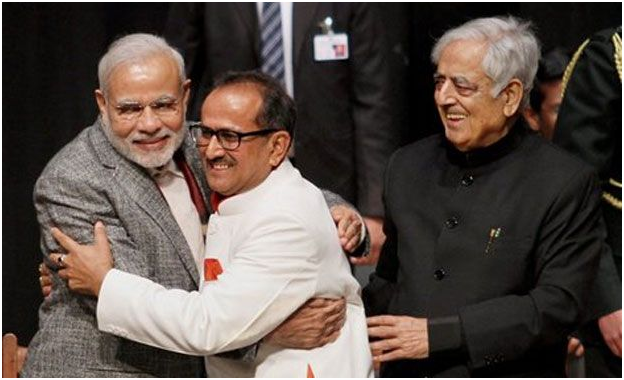Mufti Ushers in BJP Raj in Jammu and Kashmir
Prime Minister Narendra Modi, Deputy Chief Minister of Jammu and Kashmir Nirmal Singh as Chief Min

NEW DELHI: It was vintage Mufti Mohammad Sayeed, as he addressed his first press conference after bringing in the Bharatiya Janata Party in government for the first time in Jammu and Kashmir. Former Hurriyat leader Sajad Lone stood by, having made it to the Council of Ministers with the open support of the BJP in these Assembly elections.
The Agenda for Alliance was released. Deputy Speaker, BJP’s Nirmal Singh defended it while keeping a low profile, and allowing Mufti to wax eloquent. And there was not a line in the document or in what Mufti said that basically contradicted any of the reservations voiced by other political parties, columnists, and indeed Kashmiris about the Armed Forces Special Powers Act, or for that matter Article 370.
But this did not stop Mufti from giving his own spin to the alliance, by focusing more on former Prime Minister Atal Behari Vajpayee and less on the controversial personality of Prime Minister Narendra Modi. He devoted a big chunk of his opening remarks to Vajpayee, how great a ‘statesman’ he was and how he had worked for peace and harmony in Jammu and Kashmir. Mufti gave examples ranging from the talks with the Hurriyat leaders and the central government, as well as the offer of peace with Pakistan.
For Mufti the coalition was a big achievement in bringing the North and South poles together in Jammu and Kashmir. For him it was a ‘historic opportunity’ to bring “hearts and minds together.” As he said, “we want to make this alliance a turning point in the meeting of hearts and minds of the people.” And warming up to his own theme he went on to promise transparency, good governance, justice to all. And yes of course when reminded by a reporter in the question and answer session, he quickly said that corruption was the biggest issue for him, and he would give this foremost priority. How? It was not clear, but Mufti said that he would not do this Kejriwal style by using mobile phones to take photographs, but would set the rules for the officials and tell them the straight and narrow line to follow.
Mufti was clearly given a long rope by the BJP that interestingly kept silent on this first day, leaving the Peoples Democratic Party leader to use the rope whichever way he chose. And Mufti in his rambling preamble before taking questions at the press conference spoke of talks with the Hurriyat and with Pakistan. In a bid to endear himself to the Hurriyat leadership that has been very cynical and critical of the PDP efforts to form a government with the BJP, he said that peaceful elections had been possible only because the militants and the Hurriyat had not disrupted the process. This had at least one television channel getting rather agitated through the day, an indication that it is not going to be a joyride for the PDP.
Status quo will remain on Article 370 and as pointed out earlier in these columns, this basically means a freeze not just on the BJPs propaganda for the same, and the PDP’s self rule proposals. In other words more autonomy for Jammu and Kashmir is not in discussion now, with the diluted status quo remaining insofar as the coalition is concerned. This of course does not prevent the Rashtriya Swayamsevak Sangh from voicing its demand for the abrogation of Article 370.
The PDP has given in almost entirely on the Armed Forces Special Powers Act with even the withdrawal of the Disturbed Areas Act that makes this operational being subject to ‘review’ under the agreement between the two parties. Mufti’s advisor Haseeb Drabu who worked on the Agenda, pulled the chief minister out of some difficulty while answering a question on AFSPA and the time frame he had demanded earlier, saying that this was a “process” and not an “event.” In other words the high pitched campaign run by Mufti and his party that if in power he would set a time frame for the withdrawal of the vexed Act was now meaningless, and that his government would work on the “process” whatever that meant. At best the government in the state is committed to
The Agenda also has both political parties agreeing to take measures for the sustenance and livelihood of the West Pakistan refugees that has become a major issue in the Valley, following the BJP insistence that they should be resettled in Kashmir. The Hurriyat and other separatist leaders have been opposing this tooth and nail, but the Mufti is now committed under the common document to work for their rehabilitation. Of course, the Agenda that prefers obfuscation to direct phraseology is silent on what these measures will be, allowing both parties to interpret it their way. For the moment at least.
The Agenda speaks of facilitating and initiating a dialogue with “internal stakeholders” that is meant as a reference to the separatist leaders. And of course Mufti by revoking former PM Vajpayee, sought to link peace with Pakistan to peace in Jammu and Kashmir.



